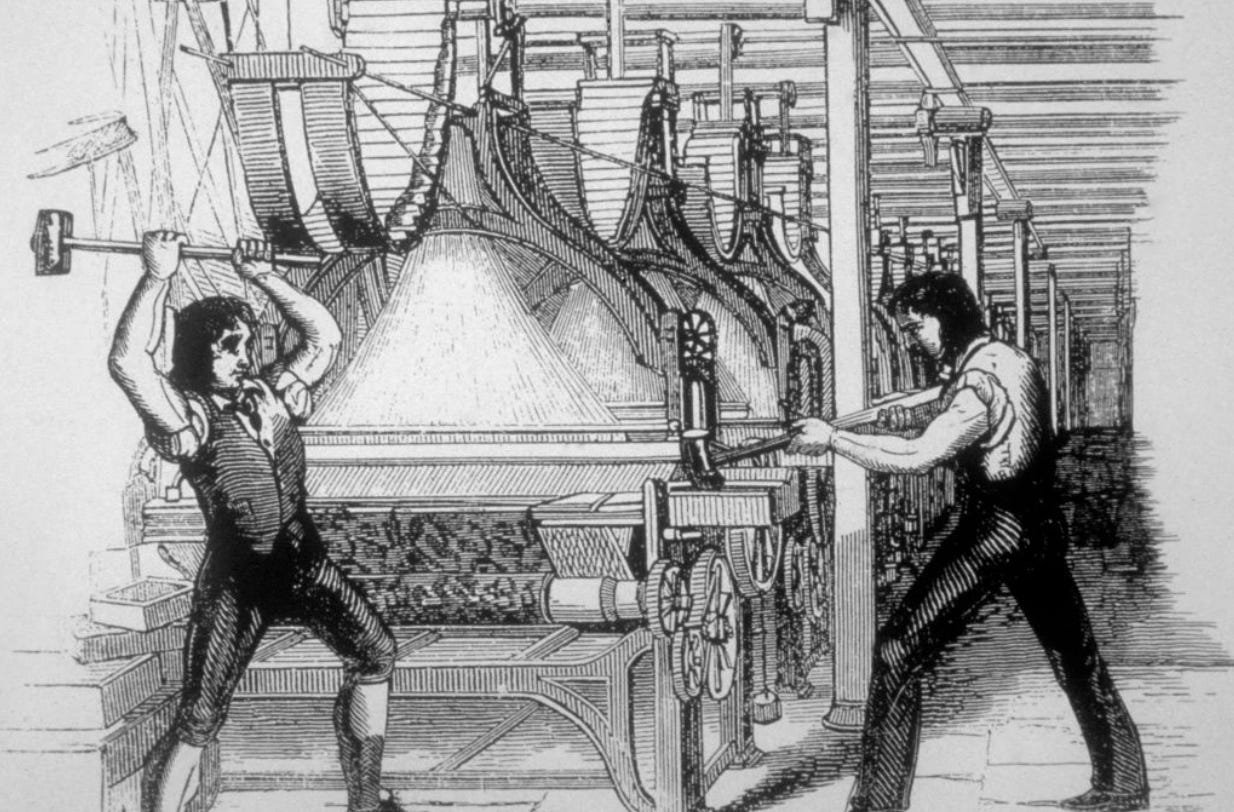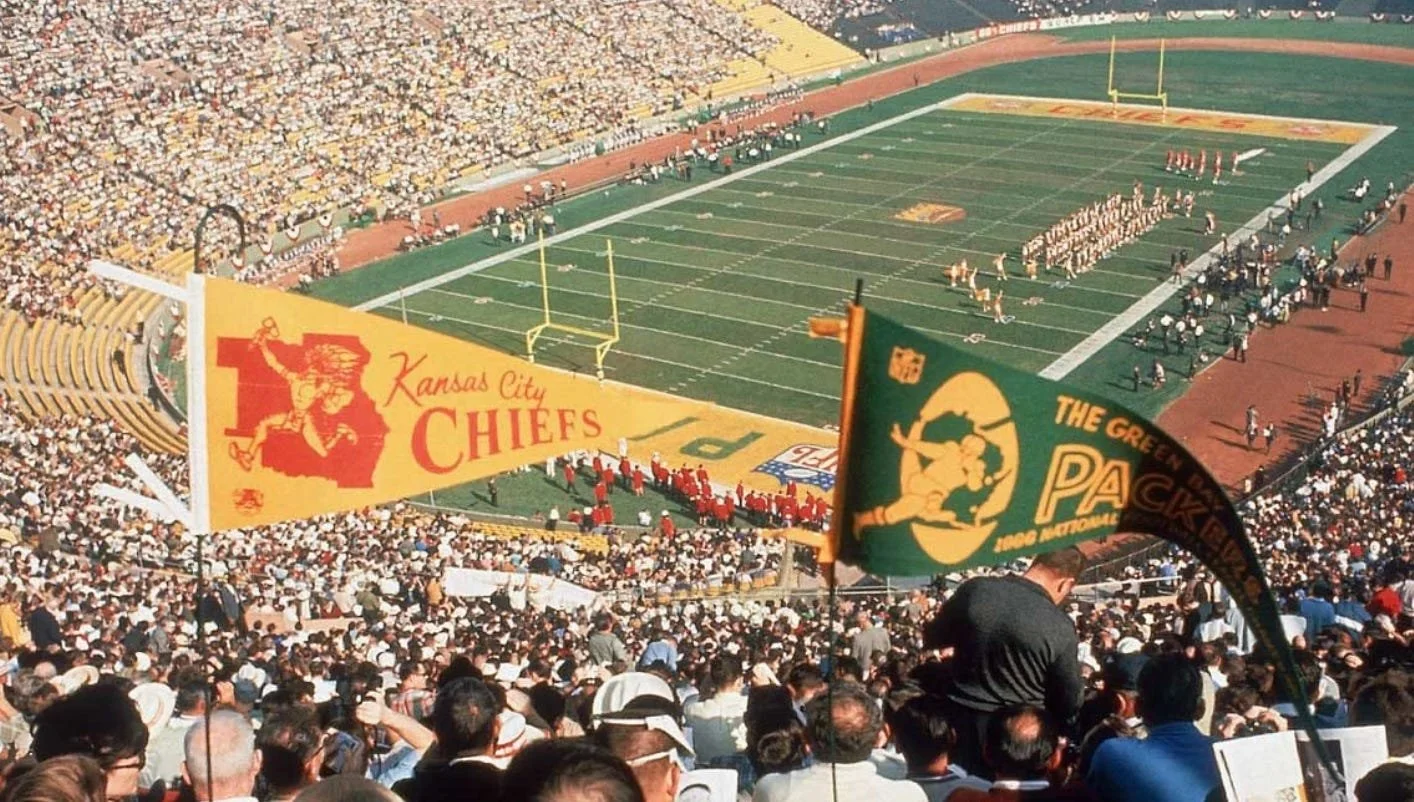Behold Your Super Bowl Weekend Recs!
Rage Against the Machine: Luddites stick it to Big Tech, circa 1812.
Dear Wags,
Luddism has enduring, pernicious appeal. In 1812, textile workers in the English Midlands began smashing up the mechanized knitting frames that jeopardized their way of life. The Industrial Revolution unleashed a flood of cheap products, depressed wages, and upended culture. The Luddite goal was to put down all machinery hurtful to commonality. The rebels described 19th century tech an obnoxious threat to social order. How prophetic. The Luddite tantrum is a footnote, but rebellions against technological dislocation aren’t quaint. They are a reliable human response to being screwed.
We teeter on the brink of change that promises to be far more profound. The digital revolution was promoted in utopian terms — it would knit us together into a global tapestry of friends. Then it promptly slid into a cesspool. That pit is polluted with content, mostly churned out by uncompensated billions.
This raw material is exploited by social media giants, who don’t make knitting frames or indeed, much of anything. The most lucrative entities on history argue that they are not publishers but hollow venues for users, who also happen to be the used. Our new tycoons can exert remarkable control over what is posted on their platforms when they choose. Yet they have successfully immunized themselves from the consequences of all they’ve unleashed.
Jonathan Taplin, gadfly and Director Emeritus of the Annenberg Innovation Lab at USC, has thoughts about this. His new book, The End of Reality, isn’t the first to argue that a handful of chummy billionaires profit from oligopolies that may threaten civilization. Still, it’s an especially tart indictment.
The robber barons of the past were curbed by a free press. The new ones control vast information systems. No Ida Tarbell can bring them down. Their platforms not only give them unparalleled influence, they’ve encouraged the disputation of reality itself. This power is derived from infrastructure developed by the government, but they nurse libertarian fantasies about breaking the monetary system and taking the old world order with it. They’ve spurred on the rise of artificial intelligence, which, in short order, may claim as many as 45 million U.S. jobs. That’s a far more cataclysmic dislocation than what roiled the Midlands two centuries ago.
In response, the regulatory state has shrugged. The prescription for dealing with looming dislocation seems to be to strap on a VR headset and pretend to be elsewhere. A few tech visionaries have proposed putting soon-to-be outmoded humanity on the dole. They’ve clearly never met our politicians. These notions are more fanciful than building an Oz for techies in the Sacramento delta.
Real solutions require action from humans who aren’t on the payroll. The Hollywood strikes were not a Left Coast aberration but a sign that rising numbers of people aren’t buying utopian spiels anymore. These rebels don’t want their creativity ingested for free; they’re in it for a living, not the friends. The new mood is apparent in the New York Times lawsuit against Microsoft and OpenAI. To level the informational playing field, Taplin wants Section 230 of the Communications Decency Act—which exempts social media empires from the rules applied to publishers— scrapped.
That’s always been a nonstarter. After all, it would disrupt the internet as we’ve know it, and of all the things that may turned upside down, we can’t have that. Then again, is anybody happy with the internet as we know it? Unless we wish to experience Luddism on steroids, it’s time to build a technological future that works for everyday humans.
Yours Ever,
Super Bowl I, Jan 15, 1967: The Packers beat the Chiefs, 35-10.
Last Hurrah
The Super Bowl (CBS). The Super Bowl is the last unqualified success of our pop culture. On Feb. 11, Americans of all persuasions will watch the Kansas City Chiefs square off against the San Francisco 49ers, critique 30 second commercials that cost advertisers $7 million a pop, sit through Usher’s glitzy half-time show, and count the times Taylor Swift is captured on camera. Did we mention there will be nachos? The genius of this linear experience is that it demolishes silos and puts more than 100 million punters in the same tent. When it comes to shared extravaganzas, nothing else can touch it.
The Super Bowl’s persistent success points to the failure of most everything else. We routinely described our media landscape as fragmented; shattered might be more apt. The power of sport is that it can subsume grievance for a moment, but the Super Bowl isn’t immune to the creep of mistrust. What used to be a given—that this tacky extravaganza was as American as apple pie—is being questioned in surprising quarters. The most familiar cultural touchstone becomes another veil for hidden conspiracy.
As a species, we require a sense of belonging. For all its faults, mass media occasionally helped us find it at scale. A football game is hardly a civilization. The Super Bowl can be faulted for crassness, brutality, exploitation, and outrageous greed. But it’s worth remembering that it’s one of the few distractions that brings so many of us together. For a little while longer anyway. — Phillip Elliot
Crime Story
Tokyo Vice (Max). What Tokyo Vice shares with its ancestor, the late, great Miami Vice (1984-1990) is the chilly stylishness of a luxury sedan advert and the sharpness of a stiletto. Also, it has Ansel Elgort speaking speaking crisp Japanese as a Yank journalist covering the sinister doings of the yakuza. In Season 2, he reunites with Magnificent Ken Watanabe as the cop guiding him through the underworld. Rachel Keller and Rinko Kinkuchi also return for another dive into the underworld.— Yoshitaka Nishi




